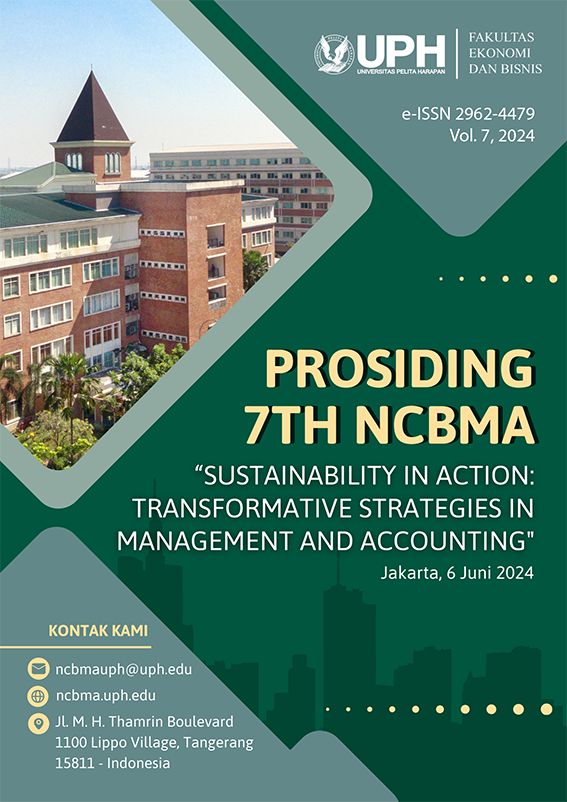THE INFLUENCE OF GREEN ADVERTISING ON CUSTOMER LOYALTY SENSATIA BOTANICALS IN SURABAYA
Keywords:
Green Advertising, Customer Loyalty, Sensatia BotanicalAbstract
Green advertising has emerged as a strategic approach for businesses to promote their environmentally friendly products and practices while appealing to environmentally conscious consumers. This study aims to investigate the impact of green advertising on customer loyalty, focusing on Sensatia Botanicals in Surabaya, Indonesia. Through a combination of quantitative methods, data will be collected from customers to explore their perceptions of Sensatia Botanicals' green advertising initiatives and their effects on loyalty towards the brand. The findings of this research will contribute to the understanding of how green advertising influences customer loyalty in the context of a specific company operating in Surabaya. This study also provides insights for businesses seeking to develop effective green advertising strategies to enhance customer loyalty and contribute to sustainable business practices.
References
Aaker, D. A. (2012). Building strong brands. Simon and Schuster.
Aaker, D. A. (1997). Manajemen Ekuitas Merek. Jakarta: Spektrum Mitra Utama.
Arseculeratne, D., & Yazdanifard, R. (2013). How Green Marketing Can Create a Sustainable Competitive Advantage for a Business. International Business Research, 7(1), 130-137. https://doi.org/10.5539/ibr.v7n1p130
Chadwick, P. H., & McGowan, I. R. (1972). Determination of plutonium and uranium in mixed oxide fuels by sequential redox titration. Talanta, 19(11), 1335-1348. https://doi.org/10.1016/0039-9140(72)80130-9
Chaudhuri, A., & Holbrook, M. B. (2001). The chain of effects from brand trust and brand affect to brand performance: The role of brand loyalty. Journal of Marketing, 65(2), 81-93. https://doi.org/10.1509/jmkg.65.2.81.18255
Firdaus, M. M. (2021). Metodologi penelitian kuantitatif; dilengkapi analisis regresi IBM SPSS Statistics Version 26.0. CV. Dotplus Publisher.
Ghozali, I. (2016). Aplikasi analisis ultivariate dengan program IBM SPSS 23.
Griffin, J. (2005). Customer Loyalty: Menumbuhkan dan Mempertahankan Kesetiaan Pelanggan. Jakarta: Erlangga.
Jacoby, J., & Kyner, D. B. (1973). "Brand Loyalty vs. Repeat Purchasing Behavior". Journal of Marketing Research, 10(1), 1-9.)
Janna, N. M., & Herianto, H. (2021). Konsep uji validitas dan reliabilitas dengan menggunakan SPSS.
Juliana, A. T., Tresnati, R., Estri Mahani, S. A., Studi Manajemen, P., & Ekonomi dan Bisnis, F. (2017). Prosiding Manajemen Pengaruh Green Marketing terhadap Keputusan Pembelian (Survey Pelanggan pada Produk. Prosiding Manajemen, 3(2), 1-7.
Kressmann, F., Sirgy, M. J., Herrmann, A., Huber, F., Huber, S., & Lee, D. J. (2006). Direct and indirect effects of self-image congruence on brand loyalty. Journal of Business Research, 59(9), 955-964. https://doi.org/10.1016/j.jbusres.2006.06.001
Kotler, P., & Keller, K. L. (2012). Marketing Management (14th ed.). Upper Saddle River, NJ: Prentice Hall.
Surachman, S. A. (2008). Dasar-dasar Manajemen Merek. Malang: Bayumedia Publishing.
Kotler, P., & Keller, K. L. (2016). Marketing Management (15th ed.). Upper Saddle River, NJ: Pearson.
Limbu, Y. B., & Ahamed, A. F. M. J. (2023). What Influences Green Cosmetics Purchase Intention and Behavior? A Systematic Review and Future Research Agenda. Sustainability (Switzerland), 15(15). https://doi.org/10.3390/su151511881
Majeed, M. U., Aslam, S., Murtaza, S. A., Attila, S., & Molnár, E. (2022). Green Marketing Approaches and Their Impact on Green Purchase Intentions: Mediating Role of Green Brand Image and Consumer Beliefs towards the Environment. Sustainability (Switzerland), 14(18), 1-18. https://doi.org/10.3390/su141811703
Marcus, G. L., Wattimanela, H. J., & Lesnussa, Y. A. (2012). Analisis regresi komponen utama untuk mengatasi masalah multikolinieritas dalam analisis regresi linier berganda. BAREKENG: Jurnal Ilmu Matematika Dan Terapan, 6(1), 31-40.
Marwan, M. P., Konadi, W., Kamaruddin, S. P., & Sufi, I. (2023). Analisis Jalur dan Aplikasi SPSS Versi 25: Edisi Kedua. Merdeka Kreasi Group.
Nguyen-Viet, B., & Nguyen, A. T. L. (2024). Vietnamese consumer’s perspective on green beauty care products: Exploring the impact of animal welfare concerns and skepticism toward green advertising. Acta
Oliver, R. L. (1999). "Whence Consumer Loyalty?". Journal of Marketing, 63, 33-44.
Psychologica, 244(December 2023), 104210. https://doi.org/10.1016/j.actpsy.2024.104210
Peattie, K., & Crane, A. (2005). Green marketing: Legend, myth, farce or prophesy? Qualitative Market Research: An International Journal, 8(4), 357-370. https://doi.org/10.1108/13522750510619733
Polonsky, M. J. (1994). An Introduction To Green Marketing. Electronic Green Journal, 1(2). https://doi.org/10.5070/g31210177
Rajeev, K. (2016). . Green marketing: The next big thing. Advances in Management. 9(2), 1-4.
Suryawan, T. G. A. W. K., , I Komang Sumerta, I. G. A. V., & Abdullah, S. (2022). JBTI : Jurnal Bisnis : Teori dan Implementasi. Jurnal Bisnis, 11(2), 134-148.
Reichheld, F. F., & Sasser, W. E. (1990). "Zero Defections: Quality Comes to Services". Harvard Business Review, 68(5), 105-111.
Yuliara, I. M. (2016). Regresi linier berganda. Denpasar: Universitas Udayana
Downloads
Published
Issue
Section
License
Copyright (c) 2024 Janice Carysa Siahaya, Yanuar Dananjaya

This work is licensed under a Creative Commons Attribution-ShareAlike 4.0 International License.

